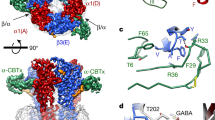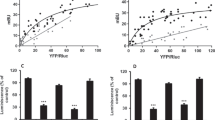Abstract.
We screened 124 individuals for single nucleotide polymorphisms of the α1, β3 and γ2 genes of the GABAA receptor in the regions corresponding to the ligand-binding domains on the protein level. In a patient with chronic insomnia, a missense mutation was found in the gene of the β3 subunit. This mutation results in the substitution of the amino acid residue arginine for histidine in position 192 (β3(R192H)). The patient was found to be heterozygous for this mutation. Functional analysis of human α1β3(R192H)γ2S GABAA receptors using ultra fast perfusion techniques revealed a slower rate of the fast phase of desensitization compared with α1β3γ2S GABAA receptors. Additionally, current deactivation [a major determinant of inhibitory postsynaptic current (IPSC) duration] was faster in the mutated receptors. This raises the possibility of decreased GABAergic inhibition contributing to insomnia, as some members of the patient's family also suffer from insomnia. The mutation β3(R192H) might, therefore, be linked to this condition. The intron/exon boundaries of the α1 subunit gene were also established and three additional variants were found in the α1 and β3 genes.
Similar content being viewed by others
Author information
Authors and Affiliations
Additional information
Electronic Publication
Rights and permissions
About this article
Cite this article
Buhr, A., Bianchi, M.T., Baur, R. et al. Functional characterization of the new human GABAA receptor mutation β3(R192H). Hum Genet 111, 154–160 (2002). https://doi.org/10.1007/s00439-002-0766-7
Received:
Accepted:
Published:
Issue Date:
DOI: https://doi.org/10.1007/s00439-002-0766-7




